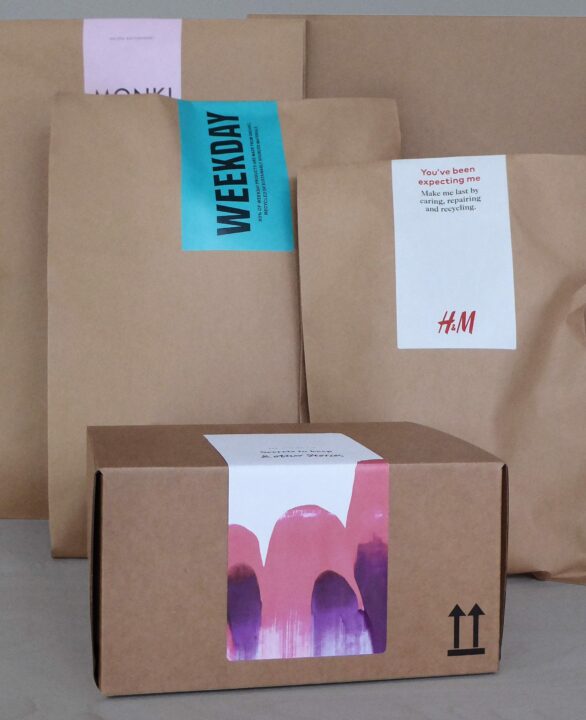Packaging protects our products when transported, but it shouldn’t cause more damage than it prevents.
Packaging
The challenge
We use packaging when we transport our products between our suppliers, distribution centres and stores, as well as to our customers. It helps items arrive safely, reducing damage and waste.
However, all packaging uses resources, such as paper, plastic and energy, and it creates waste.
Our approach to packaging

We take a holistically approach, looking at reducing the amount of packaging we use, improving packaging design, prioritising recycled materials, and using only sustainably sourced material such as FSC certified paper if virgin material is required. Our strategy is based on Ellen MacArthur Foundation (EMF)’s key principles – eliminate waste and pollution, circulate products and materials (at their highest value), and regenerate nature.
We’ve set several key goals for packaging, which support our wider climate, materials and circularity goals:
- Absolute reduction in plastic packaging of 25% by 2025 (2018 baseline).
- Design 100% of packaging to be recyclable, and where relevant reusable, by 2025.
- Make 100% of packaging from recycled or sustainably sourced materials by 2030, with a preference for post-consumer recycled materials.
- Reuse or recycle 100% of packaging from our own sites by 2025.
Projects and actions
Reducing packaging volume
We are reducing the amount of packaging we use by optmising its size and weight, as well as eliminating any unnecessary packaging.
Canopy
We support Canopy’s Pack4Good initiative, which encourages companies to think innovatively about packaging and switch to sustainable alternatives such as recycled fibres, fibres from sources such as agricultural residues, and FSC-certified sourced paper.
Tackling plastic pollution
Transport hangers make up the bulk of the plastic we use. We have set up a closed loop to make sure they are reused and then eventually recycled. Our next biggest use of plastic is polybags. We are reducing unnecessary ones and optimising the size of those we use to transport products. In addition, we are testing solutions to cut the volume of polybags we use and where we do use plastic in our polybags, we are increasing the share of postconsumer recycled plastic.
Swapping plastic for paper
Upgrading our packaging for online purchases to FSC certified paper bags and cardboard boxes has helped us take an important step towards becoming more circular. We’ve phased out single-use plastic for online orders, so we can get our products to our customers in easy to recycle packaging.
Global commitment on plastic
To fight plastic pollution, we have signed the global commitment on plastic, led by Ellen MacArthur Foundation in collaboration with the UN Environment Programme, to support a common vision to develop a circular economy for plastics in which plastic never becomes waste or pollution.
Fashion Pact
Fashion Pact is a global coalition of companies committed to key environmental goals in three areas: stopping global warming, restoring biodiversity and protecting the oceans. As part of the Fashion Pact, we are working towards eliminating unnecessary and problematic plastic and increasing the amount of recycled plastic in packaging.
We publish our Sustainability Progress Report annually. In this document, we set out our goals and the progress we’ve made in the previous year. Find the latest version here. More up to date information can be included on this page.
RELATED